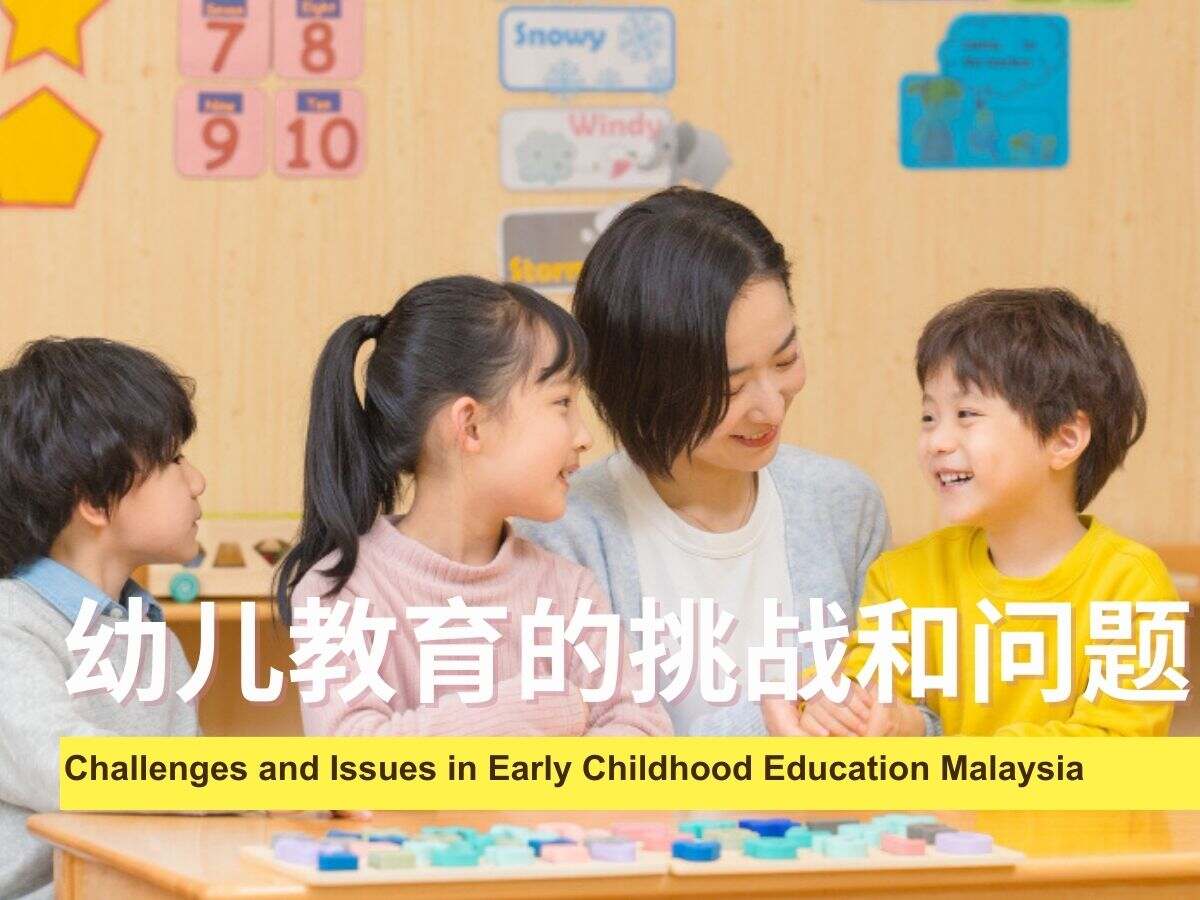Challenges and Issues in Early Childhood Education Malaysia

Early childhood education in Malaysia is facing many challenges. These challenges are making it difficult to provide high-quality education to young children. They are also having a long-term impact on the future of Malaysia’s children.
In this article, we will delve into the most important challenges facing early childhood education in Malaysia in 2023. We will also talk about possible solutions to these challenges.
We aim to help people understand the challenges facing early childhood education in Malaysia so we can work together to overcome them. We want to ensure that all children in Malaysia have access to high-quality early childhood education, setting the stage for a brighter future.
Top Issues and Challenges in Early Childhood Education in 2023
Let’s delve deeper into these pressing concerns:
Evolving Technology
In the modern era, technology is advancing at an unprecedented rate, transforming how we live, work, and learn. Early childhood education teachers must grapple with incorporating these technological advancements into their teaching methods.
While technology can enhance future learning experiences by making education more engaging and interactive, it also poses a challenge. Early childhood teachers, must balance utilizing technology as a valuable tool and ensuring it doesn’t overshadow the importance of hands-on, real-world experiences for young children.
Lack of Resources
Resource constraints continue to be a significant hurdle in early childhood education. Many educational institutions, especially those in underserved areas, struggle with limited funding, outdated learning materials, and inadequate infrastructure. The need for more essential resources can hinder the delivery of quality education, leaving educators and students grappling with suboptimal learning conditions.
Compensation Levels are Low
One of the longstanding challenges in early childhood education is the low compensation for educators. Despite their critical role in shaping young minds, many early childhood educators receive salaries that do not reflect the value of their work. This disparity in compensation can lead to demotivation and make it challenging to attract and keep highly qualified early childhood educators.
Inadequate Training and Professional Development
Continuous training and professional development are more critical in an era of evolving teaching methods and pedagogical approaches. Not all early childhood educator has the opportunity to participate in professional development. Inadequate training can result in preschool teacher being ill-prepared to meet the diverse needs of their young learners and adapt to new teaching methodologies.
Lack of Parent Involvement and Communication
Effective communication and collaboration between educators and parents are vital for a child’s holistic development. Even so, a common challenge is the lack of active parent involvement in their child’s early education. This can result from various factors, including time constraints and a lack of awareness about the importance of parental engagement. Ensuring parents are active partners in their child’s educational journey remains a challenge in 2023.
Mental Health Issues
Educators in the early childhood education sector face unique stressors and challenges that can impact their mental health. The responsibility of nurturing young minds, coupled with high expectations and sometimes challenging working conditions, can lead to burnout declining mental health and serious mental health issues among educators. Addressing these concerns and providing adequate support is crucial to maintaining a healthy and motivated teaching workforce.
Workplace Burnout
Workplace burnout is a pervasive issue in the field of early childhood education. The combination of low compensation, long working hours, and the emotional demands of working with young children can take a toll on educators. Burnout affects educators’ well-being and can also impact the quality of education provided to children.
Overcome These Issues with the YEC Early Childhood Course Malaysia

Advanced Training for Educators
One of the primary ways the YEC Early Childhood Education Courses contributes to resolving these challenges is by providing advanced training for educators. In an evolving educational landscape, staying up-to-date with the latest teaching techniques, child development theories, and technological advancements is crucial.
The YEC course offers a comprehensive school curriculum that equips educators with the knowledge and skills to adapt to these changes effectively. Educators enrolled in the YEC course learn innovative teaching methods that meet the specific needs and early literacy needs of young learners.
During the YEC Early Childhood Course, educators learn how to integrate technology, ensuring children enjoy digital tools without feeling overwhelmed. This advanced training empowers educators to create dynamic and engaging learning environments that align with the expectations of 21st-century education.
Building a Supportive Community
The YEC Early Childhood Course doesn’t focus on individual training and emphasises the importance of building a supportive community of educators. This community is a platform for educators to share experiences, exchange best practices, and collaborate on solutions to common challenges.
Educators can find creative solutions to problems like resource scarcity and low compensation through collaborative efforts and shared knowledge. They can develop strategies to enhance parent involvement and communication, fostering a sense of partnership between schools and families. This supportive community acts as a source of motivation and encouragement, combating the feelings of isolation that some educators might face.
Advocating for Change
YEC is also a passionate advocate for positive change in the field of early childhood education in Malaysia. The organisation actively campaigns for better compensation and improved working conditions for educators. By raising awareness about the vital role early childhood educators play in a child’s development, YEC strives to elevate the profession’s status.
Through advocacy efforts, YEC aims to address issues such as low salaries and workplace burnout. By collaborating with educational institutions, policymakers, and stakeholders, YEC seeks to bring about policy changes that recognize and reward the dedication of educators.
Promoting Parent Engagement
Parent involvement in a child’s education is critical to their success. YEC’s Early Childhood Course emphasises strategies to promote effective parent-teacher communication. Educators are equipped with communication skills and techniques to engage parents in their child’s education journey.
By fostering a partnership with parents, educators can ensure that children receive consistent support at home and in the classroom. This involvement enhances the child’s overall development and helps address the challenge of limited parent engagement in early education.
Prioritising Educator Well-being
Recognizing the mental health challenges that preschool teachers face due to the demanding nature of their profession, YEC places a significant emphasis on the well-being of educators. The course offers resources and support to address mental health concerns and reduce workplace burnout.
Many teachers are encouraged to practice self-care, manage stress, and seek help if needed. By prioritising the mental health of educators, YEC ensures that they can continue to provide high-quality education while maintaining their well-being.
Final Thought
In conclusion, early childhood education in Malaysia stands at a critical juncture, facing various challenges and issues that demand our immediate attention. Yet, amidst these challenges, there is hope and a path towards a brighter future for our young learners. The YEC Early Childhood Course emerges as a beacon of hope and a catalyst for change in early childhood education.
As we’ve explored the evolving technology landscape, resource limitations, low compensation, inadequate teacher training, and the need for increased parent involvement and mental health support, it’s evident that the journey towards effective early childhood education is riddled with obstacles. Yet, these challenges make the YEC Early Childhood Course all the more essential.
The YEC course offers a comprehensive solution by providing advanced training for educators, fostering a supportive community, advocating for positive change, promoting parent engagement, and prioritising the well-being of educators. Through these concerted efforts, the YEC Early Childhood Courses are not early childhood education programs; it’s a promise—a promise to empower educators, enrich our children’s educational system and experience, and shape a brighter future for our nation.
Don’t miss this opportunity to be a catalyst for change. Access Now: YEC Early Childhood Course. Together, let’s shape a better tomorrow for our children.
